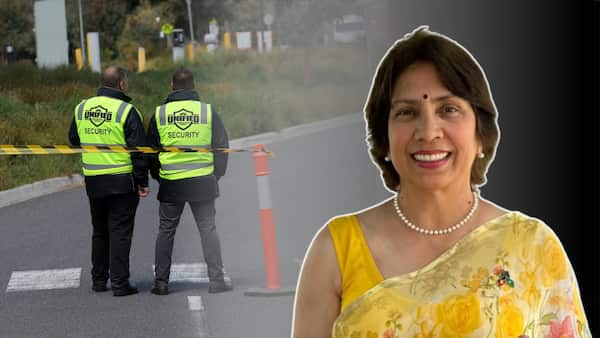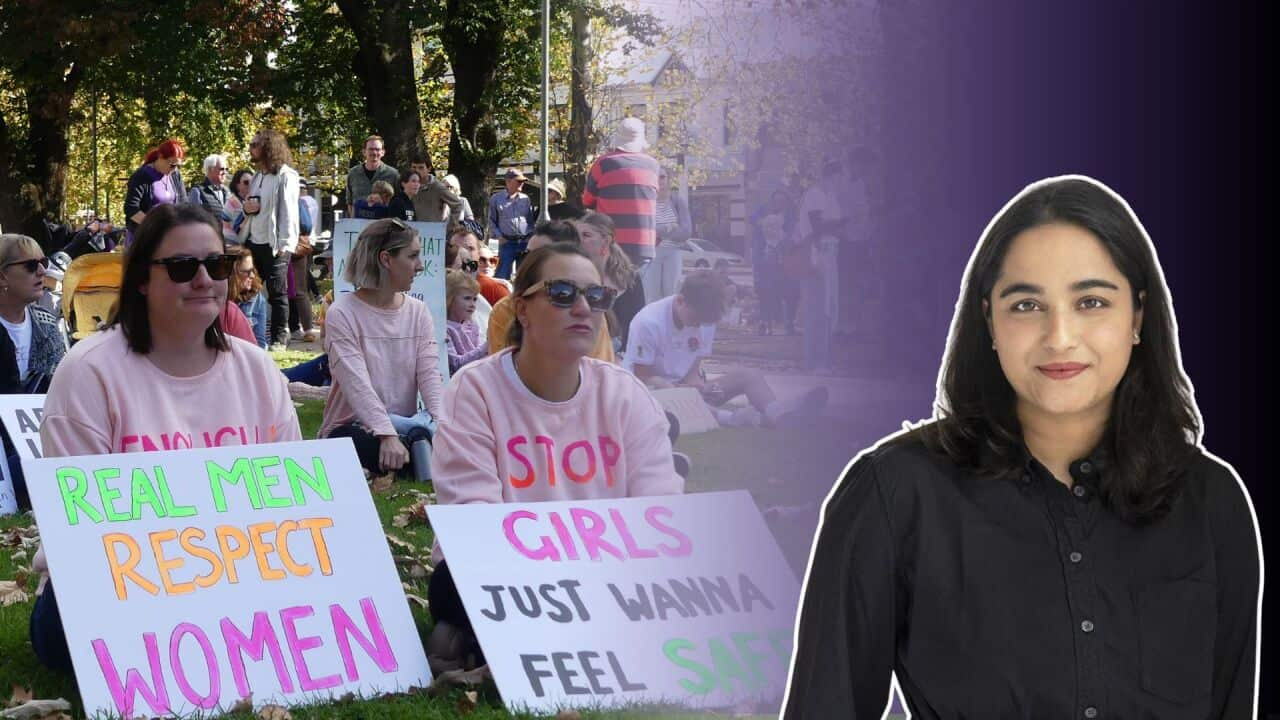Key Points
- 54 per cent of female international students have allegedly experienced sexual violence or intimate partner violence in the past year, according to a national survey.
- The survey was conducted in five languages, including Hindi, Nepali and Vietnamese, from 2021 to 2023.
- Divya Patpatia, a lawyer who identifies as a victim of physical assault, highlights the importance of reporting such crimes.
Sudha (name changed) recalls an incident when, as an international student, she was approached by a man while walking home.
"I was talking to my colleague when this man threatened me and then pulled down his pants," she said.
According to Sudha, she reported the incident to the police but did not receive a response.

Australia is one of the most popular study destinations for international students. (Representative image of a university) Credit: Darron Cummings/AP/AAP
A year later, she was allegedly stalked by another man who followed her while driving a taxi.
"He would send me random texts and later admitted to stalking me. These two incidents have severely impacted my mental health, and I have struggled to recover," she shared.
"I gave up my job and confined myself to my home. Even though I'm married now, I still haven't been able to recover or return to work, as the fear of being stalked lingers."
A recent national survey revealed that sexual violence and intimate partner violence are prevalent among women international students, with over 40 per cent of participants reporting experiences of sexual violence after arriving in the country.
Melbourne-based , who was allegedly "physically assaulted" in 2021, also shared her experience.
"It was just a regular day for me when I was attacked by a stranger, reportedly facing mental health issues. I was physically restrained during the assault and threatened with a knife," she said.

Divya Patpatia is a Melbourne-based lawyer. Credit: Supplied by Divya Patpatia
She said that after her story was reported in the media, many in her community distanced themselves from her and her family back home, almost as if they were blaming her for what happened.
"It wasn't a sexual assault, but the fact that I was alone in the room with him was questioned by many," she said.
Patpatia, an employment and workplace relations lawyer, now stresses the importance of victims reporting such crimes to the police, friends or anyone they trust.
"The impact of sexual assaults or similar crimes is far greater when the perpetrator is someone you know and live with," she said.

A screengrab taken from a supplied video of a woman jogging in suburban Sydney, who has been attacked from behind by a man. (Representative image) Credit: PR IMAGE/AAP
New study
A team of researchers from the University of Melbourne, Monash University and Deakin University conducted a national survey of female international students from 2021 to 2023 in five languages, including Hindi, Nepali and Vietnamese.
The study, titled 'Experiences of Sexual and Intimate Partner Violence Among Women International Students in Australia', was published recently in the academic journal.
The authors stated that the survey's questions regarding sexual assaults were carefully framed to ensure they were appropriate and acceptable for international students.

Over 40 per cent of the participants reported having encountered at least one instance of sexual violence since arriving in Australia. Credit: Chong Kee Siong/Getty Images
The findings showed that almost 54 per cent had allegedly experienced sexual violence or intimate partner violence in the past year, with strangers being the most common perpetrators, accounting for 62.2 per cent of cases.
Over 40 per cent of the participants reported having encountered at least one instance of sexual violence since arriving in Australia.
The most common forms of abuse included unwanted sexual comments, staring, actions that made them feel unsafe, groping, kissing or touching, as well as repeated pressure for sex after saying "no".

A team of researchers conducted a survey in five languages. Credit: VioletaStoimenova/Getty Images
"Social support, housing stress and financial insecurity were associated with an increased likelihood of victimisation, highlighting critical areas for improvement in government policies and tertiary institutions," the lead author, University of Melbourne Professor Laura Tarzia, said.
Time for action
The study acknowledged that "international students were away from their usual support structures and faced several cultural and systemic barriers to service access".
"Tertiary education institutions could do more to support students to find affordable, safe, and secure housing and avoid turning a blind eye to potentially exploitative housing conditions that may place students at risk of violence," it added.
"Ensuring that international students are linked-in with social networks may also help to reduce the risk of experiencing violence, or to ameliorate its impacts after it has occurred."
Tarzia said there was also a need for culturally sensitive and linguistically appropriate education around such issues for international students.

Laura Tarzia is a professor in the Department of General Practice and Primary Care at The University of Melbourne. Credit: HARRIET TARBUCK/Supplied by Prof Laura Tarzia
"If you're feeling uncomfortable, the first most important thing to do is report it — whether to your friend, your university or the police, or maintain a log book of such happenings with you," she said.
"There is plenty of support for housing, crisis management, specialist psychological support, food, and emergency supplies ... however, such services remain out of reach due to complicated documentation, legal procedures and lack of diversity," she noted.
The study also recognised the scarcity of available data but stressed the urgency of addressing the issue.
"The study may not present a complete picture, as it does not account for other international student groups, such as those in schools, and these incidents are often underreported," Tarzia said, highlighting the importance of such conversations in raising awareness and supporting the affected cohort.
The , launched in February this year, with the authority to investigate student complaints, is anticipated to provide some hope.
LISTEN TO

Poonam was attacked while driving a bus. She welcomes 'tougher' bail laws
SBS Hindi
13:17
In a , National Student Ombudsman Iain Anderson said the body had not received "many" gender-based violence complaints so far.
"Sexual violence is never acceptable. If it happens to a student on campus, in university accommodation, or in connection with the university, please feel free to reach out to us," he said.
Anderson reassured students about the accessibility of the service.
"We're a free service. You can come to us anonymously, and we believe we can help ensure your voice is heard. Reporting to us can also help prevent it from happening to others," he said.
[If you or someone you know has experienced sexual violence, you can call 1800RESPECT on .]
Find our podcasts here at. You can also tune in toat 5pm ondigital radio, on channel 305 on your television, via theor stream from












